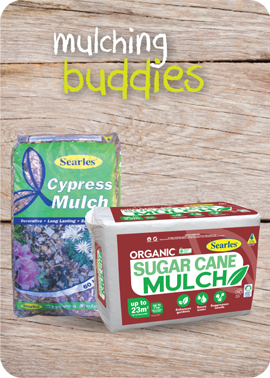|
Mulching a garden has many benefits, most we already know, but before you start laying it, think about the different types of mulches and find out the right way to apply them. This can save you time, money, effort and keep your plants happier.
Benefits of mulching
• Protect the soil from extremes of weather conditions
• Weed suppression
• Soil retains moisture, doesn’t evaporate as quickly
• Aesthetic – design features
Which mulch types are best to use
Mulches can be organic or inorganic. What is the difference? Organic mulch is made from compostable materials like straw, cane sugar, barks, composted organic matter, etc. These materials break down after time and provide the soil with extra nutrients to aid plant health and growth. Wood chips such as pine bark and cypress mulch are larger in size and are ideal to let the water penetrate through to the underneath soil. They also take longer to break down and generally easier to spread due to their lightweight properties. Inorganic mulches are generally made from rock and pebbles. Popular rocks used are, river stones, white quartz, gravel and scoria. They don’t breakdown and are more suitable for front entrance gardens, small gardens around patios and pot plants to add some design highlights.
How thick do I mulch?
It depends on the material used. If you are using mulch from packaging, good suppliers will state on the back of the packaging the rate of application. Be careful not to mulch too thickly, the water needs to soak through to the underneath soil. Mulch that is applied too thick will act as a water barrier, water will soak into the mulch and not reach the soil and roots.
Mulch not to use
Lawn clippings are unpredictable. They can contain grass seed heads and weed seeds. Don’t risk it.
Tips to mulch more effectively
- Very Important: Keep the mulch away from the base of the plant. Thick mulch up against the plant stem can lead to root rot.
- Follow the “rate of application ‘ directions on the mulch packet. Applying the mulch at the optimum rate will save you money, time and protect and water your plants effectively.
- Use a slow release fertiliser, such as Robust and water into the soil before applying the mulch.
|
 |